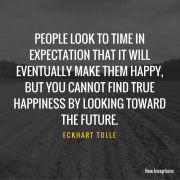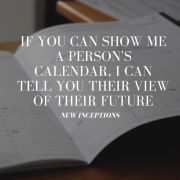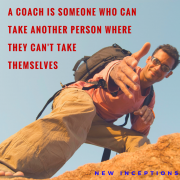Fostering a Real Culture By Expressing Real Expectations
“People look to time in expectation that it will eventually make them happy, but you cannot find true happiness by looking toward the future.” – Eckhart Tolle
Success rarely just falls into our laps. Expecting things to happen without planning or working for them is about as asinine as expecting to win the lottery.
As we’ve discussed, success comes from setting goals, making plans, and executing. Those plans usually come from some sort of expectations. Until our reality meets our expectations, we’re not going to be too happy with where we are in life.
So, to escape disappointment all together, many people suggest that you shouldn’t have expectations. While there is some truth to that (you shouldn’t expect to be an NFL player, for example) you should have expectations in life. They just need to be realistic. If you don’t have expectations in life, you won’t really get anywhere in life. An example might be graduating from high school or college. If you don’t expect to graduate, you’re not going to put the work towards it. Likewise, if we want our followers to act a certain way, we need to have expectations for them.
So how do you make expectations that are sound, but not so high that you’re always disappointed?
Types of Expectations
The first thing that we need to familiarize ourselves with are three types of expectations that we can have in our work and lives.
- Expectations with ourselves.
- Expectations of others.
- Expectations of our own success.
Expectations of ourselves. When we’re talking about expectations of ourselves, we’re talking about what we believe about ourselves to be the standard. What are things you know about yourself? Do you know your values? Do you know your strengths? How about your weaknesses? When it comes to being clutch, what do you know for certain that you can do? Once we can answer these questions, those are our expectations for ourselves.
Expectations of others. When we think about other people, we have to ask ourselves if we think they’re capable of doing great things. Do you give them the benefit of the doubt? Or do you believe that they’re incompetent? Personally, I believe that all people have a particular skill set. While it might not be the same as mine, I know that the strengths that others possess can compliment mine. This is why I love finding out what people’s strengths are. It allows me to connect them with appropriate opportunities that I would have no chance of being able to take advantage of myself.
Even with all the negativity in the world, it’s important that we stay positive about others. However, it’s also important to realize that you might find yourself surrounded with those who have low expectations for themselves and others. If you’re finding that your expectations of others are low due to these other people, then it’s time to surround yourself with those that have higher expectations. The more positive people you have in your life, the more opportunities that will come to you.
Expectations of our own success. This one is the one that many people struggle with a lot – including myself at times. However, even if you’re going through a lot of crap at a certain time, it’s important that we know that being persistent with our action will yield positive results. Many times results we won’t expect. Some call this Faith, others call it simply statistics. If you flip the coin enough times, you’ll eventually land a head.
Communicating Expectations Effectively
Once we’re aware of the expectations that we want for ourselves and those that we want to influence, we must express those expectations. Otherwise we might confuse the people we lead with double standards. If you have a goal to be a leader or an influential creator then it’s highly important that we can properly communicate our expectations and create the culture we want for our followers.
Here are six rules of thumb to follow as you set these expectations.
Make yourself the realistic example. The first and foremost thing to being a leader, is be the type of person you want to attract. When you’re able to lead by example, you’re not expecting your followers to do more than you. You’re setting the standard. This shows that you’re committed to the vision and that it’s ok to follow you as you won’t be disappearing anytime soon.
Also, make sure that you’re realistic in telling them what exactly to do. Again, don’t expect them to do more than you. If you were following someone that said “if you do what I do, then you’re going to be as successful as I am”. One, you’re more likely going to follow them and two you’re going to try and do as much as you can that they do, right? Same holds true for others.
Set them early on. The sooner you can set your standards, the sooner your followers or fans can start to expect what they’re going to get from you. You wouldn’t knowingly drive a car with no breaks. You might be considered nuts if you did. Same thing here. Set your standards early so people know what they’re getting on the ride.
Be clear with what you expect. Define your vision early. If you want people to take action, let them know. If you want a certain type of follower, make it known what they should be doing as a follower of yours.
Be optimistic. As I stated before, it’s important to be optimistic about those that you influence. Give people the benefit of the doubt that they’re capable. How would you feel if someone was trying to lead you to the “promised land” but said you couldn’t do it because of various reasons? Would you still follow them? Perhaps, but you might feel you’re being let off the hook to living to their standard. Maybe this might challenge you to do something about it. Maybe it might have the opposite effect. If you want to be certain, be optimistic.
Under promise and over deliver. The more you say your services are going to do for someone, the more you have to deliver. Do yourself a favor and make sure you do something that you know you can provide and have room to spare when it comes to your services.
Be sensible about your commitments, and diligently follow through on them. You don’t get credit for intentions, only for accomplishment. Set your followers up for success by setting aggressive but attainable goals for them.
Exceed them consistently. Again, expectations are your standards. When you exceed your expectations, it means you’re shooting for excellence. People expect you to be fair, but be generous as well. People expect you to respect them, but show you care for them, too. People expect you to be judicious when you exercise authority, but be willing to serve also. Over time, as you exceed expectations, talented people will flock to your tribe. Everyone wants to work with a leader who has their best interests in mind and leads with excellence on a consistent basis.
Homework:
As you’re starting your next project, think about what kind of standards and expectations you have for your followers. Let them know what actions they can take to help your efforts and be a part of the larger vision.
If you’ve already developed a culture, what are some things that are characteristic of that culture?







 (Check the accompanying info-graphic for proof.)
(Check the accompanying info-graphic for proof.)
